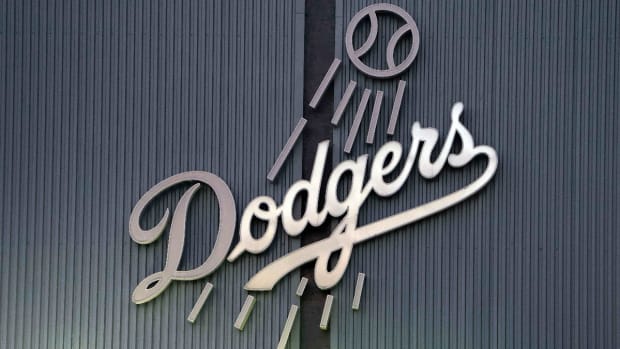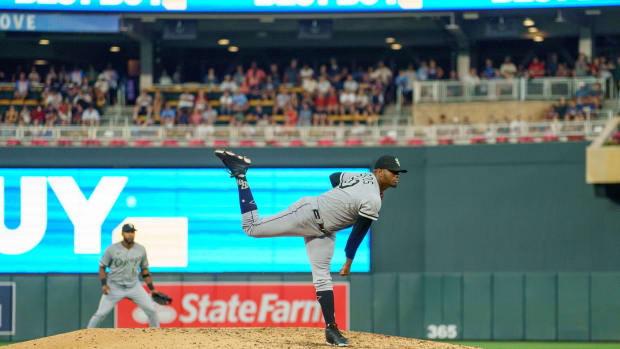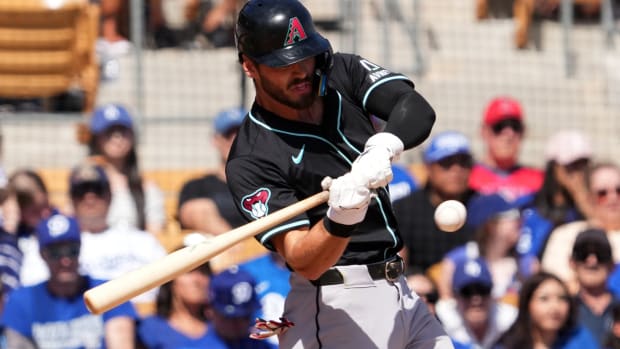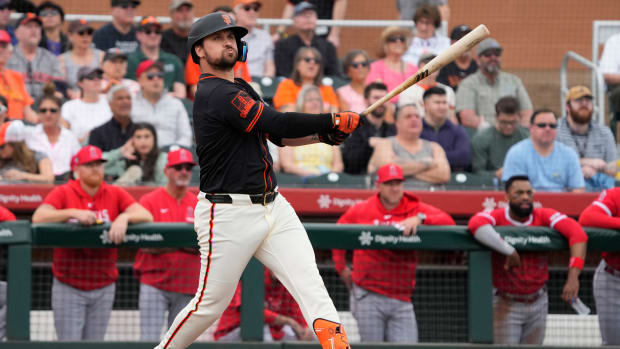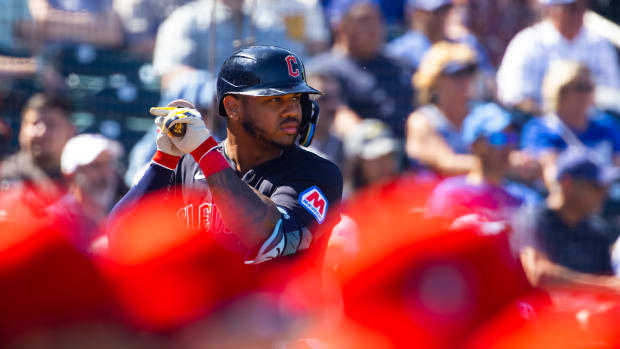Slumping Nationals aren't doomed, but horrible start doesn't bode well
This was supposed to be the Nationals' year. The consensus pick to win the NL East and the oddsmakers'—and players’—favorites to win the World Series, Washington is currently sporting the NL's second-worst record at 7–13. On the heels of their sixth straight loss, the Nats are eight games behind the upstart Mets (15–5) in the division race and looking up at the rebuilding Braves (10–9) and Phillies (8–12). While it's not out of the question that they could rebound, they've dug themselves quite a hole.
Very little has gone right for the Nationals on either side of the ball. Their offense is scoring just 3.45 runs per game, 12th in the NL, and their .215/.289/.346 slash stats rank 15th, 12th and 12th, respectively. Meanwhile, the pitching staff has allowed 4.45 runs per game, second-worst in the league, though neither the rotation nor the bullpen has been particularly awful. Instead, the defense ranks dead last in the league with a .645 defensive efficiency, 29 points behind the next-worst team and 48 behind the league average, and they're last in Defensive Runs Saved as well at -12. Not only have they been lax at converting batted balls into outs, but they’ve also been sloppy, producing league-leading totals of errors (22) and unearned runs (18). From the moment that Ian Desmond dropped David Wright's pop fly on Opening Day against the Mets, an error that turned the game around, their season hasn't been pretty:
Admittedly, injuries have been a significant factor in Washington’s struggle. Anthony Rendon, whose breakout 2014 season featured a team-high 6.5 WAR and fifth-place finish in the NL MVP voting, has yet to play this year due to a sprained medial collateral ligament in his left knee. Jayson Werth, who last year ranked second among the team's position players with 4.0 WAR, began the season on the disabled list as he recovered from surgery to repair the acromioclavicular joint in his right shoulder and has hit just .156/.250/.200 in 12 games since returning. Denard Span, fourth on the team last year in WAR (3.8), started the year on the DL as well after undergoing core muscle surgery in early March, and in seven games since returning, he's hit .207/.250/.207.
• POWER RANKINGS: Cardinals jump over Tigers, Mets for first place
Injuries, bad pitching already eating away at Blue Jays' hopes
The loss of Rendon has been particularly destabilizing, and one can't help but see its trace in the Desmond error above, as manager Matt Williams has surrounded the shortstop with a pair of infielders who are in unfamiliar places. Yunel Escobar, who was acquired in January with the intention that he would move from shortstop to second base, is instead playing third; he hadn't played either position at the big league level since 2011. That short-term shift created an opportunity for the team to take a look at Dan Uggla, whose strong spring created some amount of optimism that he was past the vision problems that led to a .171/.291/.326 line and -21 DRS in '13–14, but he has hit just .135/.200/.243 so far. He now finds himself on the bench, with Danny Espinosa back at second.
Desmond, historically a slightly subpar shortstop via both DRS and Ultimate Zone Rating but one whose offense has more than offset his shortcomings, has somehow managed to make nine errors in 20 games. His bat has yet to heat up (.253/.306/.380), and for that matter, the same is true of Ryan Zimmerman (.205/.279/.385), who's dealing with a mild case of plantar fasciitis in his left foot, which can't be helping his transition to first base. While one shouldn't put much stock in any of the individual statistical showings due to the sample sizes, the infield's combined -8 DRS suggests a unit that's not exactly jelling. If there’s good news, it’s that Rendon could be back soon, quite possibly bumping Uggla off the roster.
As for the lineup as a whole, only Escobar (113 OPS+), part-timer Espinosa (114 OPS+), since-demoted centerfielder Michael Taylor (122 OPS+) and Bryce Harper (.262/.424/.508 for a team-high 157 OPS+) have produced at an above-average clip. The 24-year-old Taylor, who came into the year ranked No. 32 on Baseball America's Top 100 Prospects list, hit .271/.314/.500 in starting the team's first 12 games before being sent to Triple A Syracuse. A .304/.390/.526 hitter with 22 homers and 34 steals in a 2014 season split between Double and Triple A, he has just 19 games of experience at the higher level, though it's not hard to imagine him returning to the big club’s roster at some point in hopes of shaking things up, particularly with Span scuffling in his final season before free agency.
• JAFFE: Return to Texas could help Hamilton rebuild life and career
David Ortiz on Cubs' Kris Bryant and why hitting is harder than ever
In light of the defense's repeated failures, which have led to a .330 batting average on balls in play, it's difficult to hold the pitching staff too much at fault. The team is in the upper third of the league in both home run and walk rates (0.6 and 2.7 per nine, respectively), and its collective 3.27 FIP ranks fourth. On the other hand, Washington's strikeout rate has been rather middling (7.6 per nine, eighth in the league), and among the starters, neither Doug Fister nor Jordan Zimmermann (4.0 and 4.8 per nine, respectively) has missed many bats, while Gio Gonzalez has walked a gaudy 4.2 per nine. Fister—whose 1.2 strikeout-to-walk ratio is less than one-third of what he managed from 2011 to '14—has a respectable 3.28 ERA but a rotation-worst 4.86 FIP; the gap between the ERAs and FIPs of Stephen Strasburg, Gonzalez and Zimmermann range from 1.7 to 2.0 runs in the other direction. The last two have failed to average six innings per start thus far, though to be fair, Zimmerman has delivered three quality starts out of four, with one 2 1/3 inning dud from April 13 accounting for much of the damage to his line.
Meanwhile, Max Scherzer has been dominant to the tune of a 1.26 ERA and 158 FIP, but a sprained right thumb sustained while batting on April 23 forced Williams to scratch him from Tuesday night's start. That turn against the Braves will instead be taken by A.J. Cole, a 23-year-old righty prospect who will be making his major league debut.
The bullpen, by comparison, has been relatively sound, stung more by a collective .327 BABIP than anything else. Closer Drew Storen has converted four out of five save opportunities, and the team won the lone game that he failed to convert. That said, the losses of middle reliever Craig Stammen to flexor tendon surgery and Casey Janssen to rotator cuff tendinitis haven't helped, though at least the latter could be back in action soon.
Brandon McCarthy injury leaves huge hole, questions in Dodgers' rotation
As a team, the Nationals haven't started a season this badly since they went 5–15 back in 2009, a season in which they lost 103 games with a roster that has since turned over nearly completely. The team hasn't lost six in a row since July 2013; on Tuesday, they'll try to avoid losing seven in a row for the first time since September 2009.
For all of the talent the Nationals have, the history of 7–13 starts in the Wild Card era is a grim one, for only the 2007 Cubs have recovered from such a stumble to win a division title. The '01 A's made the playoffs via the Wild Card, as did the '02 Angels after a 6–14 start. Los Angeles, of course, won the World Series that year, which should at least give Washington fans some hope, as should the more recent addition of a second Wild Card in each league.
Despite all the struggles, the Nationals aren't sunk yet. Via the Baseball Prospectus Playoff Odds which incorporate the team's schedule and individual PECOTA player projections for the remainder of the season, the team still has a 57.1% chance of making the playoffs by one route or another and a 7.4% shot at winning the World Series, the latter of which is fifth-highest in the majors. For a team whose odds of making the postseason stood at 78.4% in March, second-best in the majors, that's still quite a comedown, but it's nothing compared to what the situation will be if the Nationals don't pull out of their tailspin soon.






























